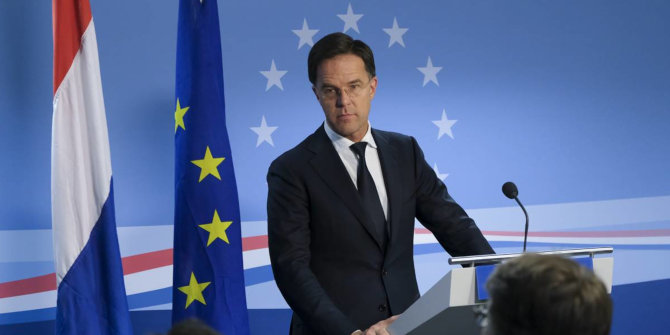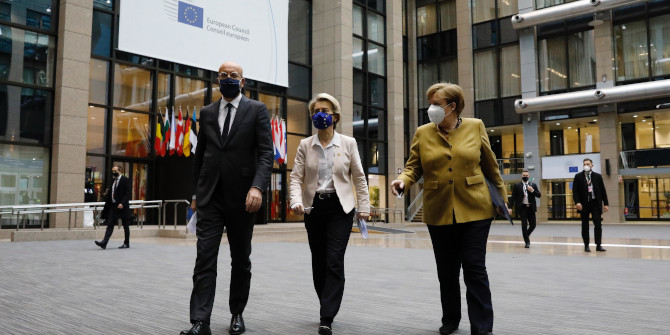
 Common debt instruments created by the European Union, of which coronabonds are currently the most urgent and salient example, evoke in some countries the fear that the Eurozone may be heading towards a ‘transfer union’. Some advocates also misleadingly justify these innovations by an appeal to European ‘solidarity’. Yet, in practice, Michael Paetz and Patrick Kaczmarczyk argue that such instruments require only a dose of pragmatism. We need to fundamentally reframe the debate around ‘debt mutualisation’ in Europe on more evidence-based and realistic lines if the Eurozone is to survive.
Common debt instruments created by the European Union, of which coronabonds are currently the most urgent and salient example, evoke in some countries the fear that the Eurozone may be heading towards a ‘transfer union’. Some advocates also misleadingly justify these innovations by an appeal to European ‘solidarity’. Yet, in practice, Michael Paetz and Patrick Kaczmarczyk argue that such instruments require only a dose of pragmatism. We need to fundamentally reframe the debate around ‘debt mutualisation’ in Europe on more evidence-based and realistic lines if the Eurozone is to survive.
In mid-March, one of us argued in a EUROPP article that there would be no way back to business as usual in the European Monetary Union (EMU). Any sober assessment of the coronavirus legacy makes it clear that the public debt ratios across European economies will increase substantially. So a common debt instrument remains the only option to address the challenge for member states’ public finances sustainably, efficiently, and effectively.
The proposal for Euro- or Corona-Bonds put forward by several European economies, and backed by the European Central Bank (ECB), faced a rejection by northern European economies. They prefer instead to draw on the European Stability Mechanism (ESM). However, as Bruegel rightly argued, the ESM’s firepower of EUR 410 billion is insufficient. And although the ESM conditionalities could be temporarily dismantled, that still leaves room for countries to be forced back into austerity after the crisis, making it an inappropriate instrument. Most importantly, the ESM proposal cannot be sold politically in the most heavily affected countries – not least, because the legacy of austerity is one of the main causes for the severity of the current crisis and (arguably for some of) the death toll.
So the Covid-19 crisis has once again exposed the rifts between the southern and northern European economies, which previously peaked during the Eurozone crisis that erupted ten years ago. The debate about ‘debt mutualisation’ is often framed around ‘solidarity’ or ‘transfers’. Germany and the Netherlands, who have reduced their debt burden over the past years, are now called to show solidarity to help Italy and Spain. But conservative, liberal, and right-wing forces in northern countries wonder why German and Dutch taxpayers should have to make up for the past insufficient saving efforts of the southerners. German newspapers are already warning about a ‘transfer union’, suggesting that the mechanisms already apply and that policymakers should resist this alleged “injustice”. Gideon Rachman recently wrote a piece in the FT, in which he expressed his sympathies for the arguments made by the northern states. However, the article revealed in the most exemplary manner how a lack of understanding of the common debt instrument leads to spurious conclusions of what they entail.

Dutch Prime Minister Mark Rutte speaking during a European Council meeting in February 2020, Credit: European Union
In reality, this issue is neither about transfers nor about solidarity. The European Central Bank (ECB) simply needs to stand ready to purchase Euro-bonds. This step would make them risk-free and facilitate funding for Eurozone member states, even if they would have to be sold to capital markets in a first instance. The necessary funds for this can be created by a simple balance sheet extension and backed by the ECB’s promise to buy – not by taking anything away from German or Dutch taxpayers. This of course applies to national government bonds purchased by the ECB also. These bonds could remain on the central bank’s balance sheet until the end of time, without any major consequences for the functioning of our European economy. Consequentially, there is as little need for ‘solidarity’ as there is for ‘transfers’. The ECB merely has to take the responsibility for sustainable interest rates of all European government debt, which does not entail any disadvantages, let alone transfers.
Understanding this point is crucial. This is precisely the mechanism by which all central banks stabilise bond prices and interest rates across capitalist economies. And it is the reason why there is no taxpayers’ money needed (and used) to bail out banks, as in 2008-2009, or to inject hundreds of billion euros, or in the case of the US, 2 trillion USD, into capital markets, as in 2020. The Eurozone might be a specific case, given that ‘monetary financing’ is forbidden by the Maastricht Treaty. Yet practically, it is exactly what happened with the ECB’s previous announcement of Outright Monetary Transactions (OMT) and subsequent bond purchasing programmes – for which the ECB faced down severe criticisms and accusations in the constitutional courts, notably in Germany.
In some ways, it is ironic that the harshest resistance comes from the country, which relied on a certain form of “monetary financing” in its currency reform 1948, which set the starting point for its post-war recovery: The ‘Ausgleichsforderungen’ (compensation claims) of the ‘Bank deutscher Länder’ (the forerunner of the German Bundesbank), created by the stroke of a pen, were booked as the counterpart of the paper bills printed and entitled ‘Deutsche Mark’. They are still on the Bundesbank’s balance sheet today.
While the tensions around common debt instruments and monetary financing in the Eurozone have started to boil, the monetary union might face its ‘Waterloo moment’ when the renewal of maturing bonds is imminent and the Pandemic Emergency Purchase Programme (PEPP) expires. Just as pure lending to small and medium enterprises (SMEs) will not suffice, because they will not be able to pay off the loans, governments will not be able to repay their debts either. If the interest rates for government borrowing were to be set by financial markets and the current deficit criteria remained in place, the Eurozone will not survive.
Firstly, the high debt burdens, especially of southern European economies (including France), will lead to exorbitant interest rates that will threaten financial stability across the Eurozone. Secondly, no political leader in the South will now be able to re-sell again the austerity medicine that previously wrecked their economies, and which certainly contributed to tens of thousands of deaths during the current pandemic. This issue has become too politically salient, and populist politicians like Salvini, Le Pen et al stand ready to capitalise from another failure of European policymakers.
It is up to policymakers in the EU, notably in the northern member states, to decide whether or not the EMU will survive. So, what needs to be done?
- Most importantly, the ECB must guarantee that all government bonds in the euro zone are risk-free. This would eliminate the possibility of national default, and thus stabilise financial markets and interest rates – regardless of how high the debt ratios may be. To this end, the ECB should be mandated to keep the interest rates low and to buy up government bonds without restriction, if interest rates rise to unsustainable levels. In a sense, it would formally allow the ECB to do what it has been doing anyway, without the need for legal acrobatics to please the Germans and/or to get around the restrictions of a dysfunctional institutional setup.
- Next, states should be allowed to invest in health care, research, education, infrastructure, social security etc. as long as their inflation rates are below or at target. This means that deficit rules have to be modified to prevent austerity measures after the crisis, which would only lead to the next harmful recession in Europe with all the political consequences laid out before.
As this argument shows, these measures do not rest on either solidarity or transfers. What is urgently needed instead is a certain dose of pragmatism. The finance ministries of northern states must give up their (untenable) dogma and start working towards the long-term survival, viability, and sustainability of the EMU beyond Covid-19.
Please read our comments policy before commenting.
Note: This article gives the views of the authors, not the position of EUROPP – European Politics and Policy or the London School of Economics.
_________________________________
 Michael Paetz – University of Hamburg
Michael Paetz – University of Hamburg
Michael Paetz is a Lecturer in the Department of Economics at the University of Hamburg. His interests are Post-Keynesian Economics and Modern Monetary Theory.
–
 Patrick Kaczmarczyk – University of Sheffield
Patrick Kaczmarczyk – University of Sheffield
Patrick Kaczmarczyk is a doctoral researcher at the Sheffield Political Economy Research Institute (SPERI) at the University of Sheffield. His research looks at the role of transnational corporations and foreign direct investments in international trade. He is currently a visiting scholar at Sciences Po, Paris.






There isn’t such a thing as the “legacy of austerity”, there is an absence of adequate reforms. Which will remain if these kind of proposals are to be implemented. Hence, it will even be worse if the rudimentary regime of the SGP deficit ceilings and the more targeted, but nevertheless powerless, approach of the Eur. Semester will be virtually abolished, as is now proposed. Will these plans not lead to huge inflationary pressures, contrary to the ECB goals and affecting its trust, and ultimately weaken the whole European economy if not underpinned simultaneously by strong political and economic surveillance of the southern economies and/or even requires (fiscal) transfers and direct policies (lacking legitimacy) to keep trust in the ECB that it can maintain the ultimate promise of bond purchasing ?
F. Spaak, do you have a theory about inflation? Or is it just risk-less gov bonds = inflation? How about the US, the UK, JAPAN, Canada, Australia, New Zealand and many other countries around the world where what is described above is the normal case, yet there is no inflation? Germany and its northern deflation allies are the main culprits of the European crisis! Blaming the lack of adequate reforms is ridiculous, given how much reform there has been in the South – and all these reforms failed to provide employment and growth